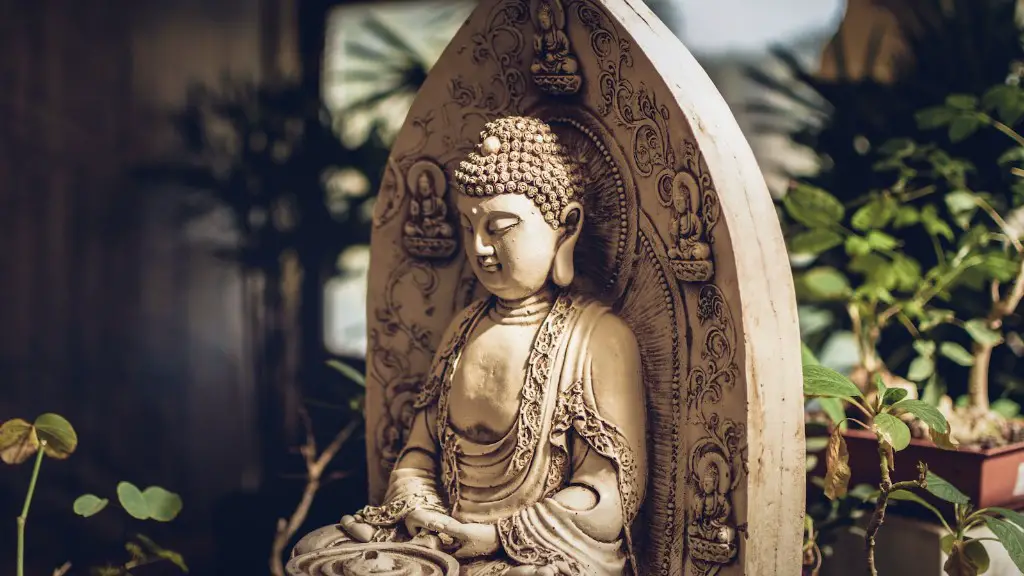Introduction
Hinduism and Buddhism are two of the oldest and most recognizable religions in the world. Both have their roots in the Indian subcontinent, but Hinduism is traditionally an Indian faith whereas Buddhism has become a world religion. Both religions have similar spiritual beliefs, but they are quite distinct from each other. In this article, we will explore the main differences between Hinduism and Buddhism.
Origins
The origins of Hinduism can be traced back to the Vedic period and the Upanishads, which are considered to be the earliest written scriptures. These sacred texts describe a philosophical system known as Vedanta, which later developed into the different Hindu denominations that exist today. Buddhism, on the other hand, was founded by Siddhartha Gautama in the 6th century BCE. Siddhartha Gautama achieved enlightenment and became known as the Buddha. He developed his own spiritual path, known as the Middle Way, and taught his followers the principles of meditation, mindfulness, and non-attachment.
Beliefs
Hinduism is polytheistic and it has hundreds of gods, goddesses, and deities. It also has a caste system which divides people into different social classes based on their birth. Buddhism, on the other hand, is non-theistic and it does not have any gods or deities. Buddhists reject the idea of a caste system and instead embrace the idea of equality and compassion for all sentient beings.
Buddhists believe in the Law of Karma, which states that good and bad deeds have consequences and that people are responsible for the consequences of their actions. Hindus also believe in the Law of Karma, but they also believe in the power of prayer and ritual to help achieve a desired outcome. Buddhists focus on the practice of mindfulness and meditation, while Hindus believe in the power of devotion and worship to attain spiritual liberation.
Practices
Hindus practice different rituals such as puja, yagna, and havan. They also revere their scriptures, most notably the Vedas and Upanishads. Hindus often visit temples and shrines, and many engage in yoga and meditation as a means of physical and mental wellbeing. Buddhism has a more practical and non-ritualistic approach to religion. Its focus is on the path to enlightenment, and its practices include meditation, mindfulness, and ethical living. Buddhists also engage in prostrations, which are a form of physical devotion.
View on the Soul
Hindus believe in the concept of the soul or ‘atman’. The atman is an everlasting entity that is believed to be the carrier of a person from one life to the next. Buddhism does not endorse the idea of an eternal soul and instead focuses on the concept of ‘anicca’, which means impermanence. Buddhists believe that all things in the universe are constantly changing, and that there is no eternal soul or atman.
Gods and Goddesses
Hinduism has many gods and goddesses, and these deities are believed to control and influence the lives of people. Hindus often pay homage to these gods and goddesses by worshipping them. Buddhism, however, is an atheistic religion and it does not believe in any gods or goddesses. Buddhists instead focus on the teachings of the Buddha and the practice of meditation.
Conclusion
Hinduism and Buddhism are two of the oldest and most widely practiced religions in the world. While there are some similarities between the two faiths, there are also many distinctions. The most obvious difference being that Hinduism is a polytheistic faith, while Buddhism is more non-theistic and atheistic. Both religions have much to offer to the world, and exploring the differences between them is an excellent way to gain greater insight into the depths of their respective spiritual teachings.
Views on Reincarnation
Hinduism believes in the concept of reincarnation, which states that after death, a person’s soul is reborn into another body. This rebirth happens multiple times until the soul is able to attain moksha, or liberation from the cycle of birth and death. Buddhism, on the other hand, does not believe in the concept of reincarnation. Instead, it focuses on the practice of meditation and mindfulness as a way to attain enlightenment and liberation.
Adherence to Doctrine
Hinduism is generally considered to be a more orthodox faith and followers of Hinduism tend to adhere closely to its ancient doctrines. Buddhism, on the other hand, is often more lenient and flexible in its interpretation of doctrine and its followers do not adhere to strict rules. Buddhists emphasize the importance of personal experience, understanding, and practice rather than strict adherence to a set of teachings.
Goals of Religion
The ultimate goal of Hinduism is moksha, which is the salvation of the soul and liberation from the cycle of birth and death. Buddhists, however, are more concerned with the attainment of enlightenment, which is a state of spiritual awakening and understanding of the true nature of reality. Both religions, however, share a similar focus on the alleviation of suffering and the promotion of love, compassion, and wisdom.
Role of Monks in Society
Hinduism has a hierarchical structure, and at the top of this structure are religious leaders and monks. These individuals are charged with teaching people about the scriptures and providing spiritual guidance. In Buddhism, monks have an important role in society as they are responsible for teaching the dharma and providing people with spiritual guidance. In both religions, the role of monks and religious teachers is highly respected and held in high esteem in society.


